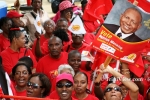By George Alleyne
October 21, 2009 – newsday.co.tt
 We should move away from the old thinking that if a Member of the House of Representatives should cast his vote not in accordance with the dictates of his Party, read Political Leader, on even a routine matter that he is a traitor and a renegade.
We should move away from the old thinking that if a Member of the House of Representatives should cast his vote not in accordance with the dictates of his Party, read Political Leader, on even a routine matter that he is a traitor and a renegade.
It is a throwback to the days when Trinidad and Tobago was a British colony and the Governor, a virtual dictator, required on pain of expulsion that all Nominated, Unofficial Members of the Executive Council voted as he directed on any issue, large or small. It was the British colonial practice. Indeed, when Timothy Roodal, a Butlerite and Member of the Executive Council, acted against the expressed wishes of the Governor in Council he was immediately expelled.
Admittedly, when the People’s National Movement accessed Office as a result of its victory at the polls on September 24, 1956 and Dr Eric Williams became Chief Minister, the Governor, Sir Edward Beetham, directed that the five nominated members — Wilfrid J Alexander, Cyril Merry, Patrick Hobson, Sir Harold Robinson and H Neal Fahey — vote at all times at the behest of Dr Williams. This directive applied also to the two official members of the Executive Council, the Colonial Secretary, Solomon Hochoy, who would later become TT’s first Governor General, and the Attorney General, Clifford de Lisle Inniss QC. The five Nominated Members and the two officials were, in addition, Members of the Legislative Council.
Perhaps I should note at this stage that two of the Nominated Members, Messrs Alexander and Merry, were placed there at the expressed wish of Dr Williams in order to guarantee the PNM Government a majority in the Legislative Chamber. The rigid in favour of the Government voting for elected PNM representatives, Nominated Members and officials was, nevertheless, understandable as the 1956 General Election and the establishment of, in essence, Cabinet Government represented the first crucial step which would take Trinidad and Tobago away from colonial rule and, clearly, was required at the time.
Williams, unfortunately however, until his death on March 29, 1981 clung almost tenaciously to the “follow the leader” principle as something which he may have viewed as being required for a somewhat extended immediate post colonial culture of the twin-island State. The truth, though, is that the British Raj had been replaced by a Trinbagonian Raj, an uncomfortable feature which remains to this day. The Williams era, or rather the first five to ten years of it should have been a transition period.
The first clear hint that the follow the leader thinking had been institutionalised came with the Crossing of the Floor Act, Act No15 of 1978 which had followed on March 31, 1978 announcement in Parliament by Minister of Works, Hector McClean, of his resignation from the “Cabinet, Government and Party” but that he would stay on in the House of Representatives as an Independent. McLean’s had been the first serious challenge to Williams’ authority. Another and earlier challenge, though outside of Parliament, had come in the run-up to the September 13, 1976 General Election when Party groups in Port-of-Spain Central, St Joseph, Toco-Manzanilla, Ortoire-Mayaro and San Juan had successfully countered Williams’ rejection of their candidates who, incidentally, went on to win their seats even without his support.
Dr Williams has been dead these many years and the transition period should have long since been history. This country is supposed to be following the Westminster system. The practice in the United Kingdom, Westminster’s home, is that the leaders of the Labour, Conservative and Liberal parties in Parliament are not elected by a national Convention but rather by the parties’ elected members in the House of Commons. A point worth noting is that in the past eight or so decades in the UK some ten Prime Ministers have been what the British like to describe as “forced from Office.”
It is a power held by the various parties’ parliamentary memberships, a culture completely foreign to this country. This does not mean that there is neither discipline in nor loyalty to Party and a Party’s Leader. While the Whip system in the UK encourages, if not tacitly ensures, support for leaders with respect to voting on crucial issues, in TT, whether PNM or UNC, it is the leaders who crack the whips. No pun intended. This can urge on autocratic leadership which the parties’ general membership should challenge in much the same way that the five PNM constituencies challenged Dr Williams in 1976.
http://www.newsday.co.tt/commentary/0,109522.html
Trinidad and Tobago News Blog’s URL for this article:
www.trinidadandtobagonews.com/blog/?p=1775
